
 i_need_contribute
i_need_contribute

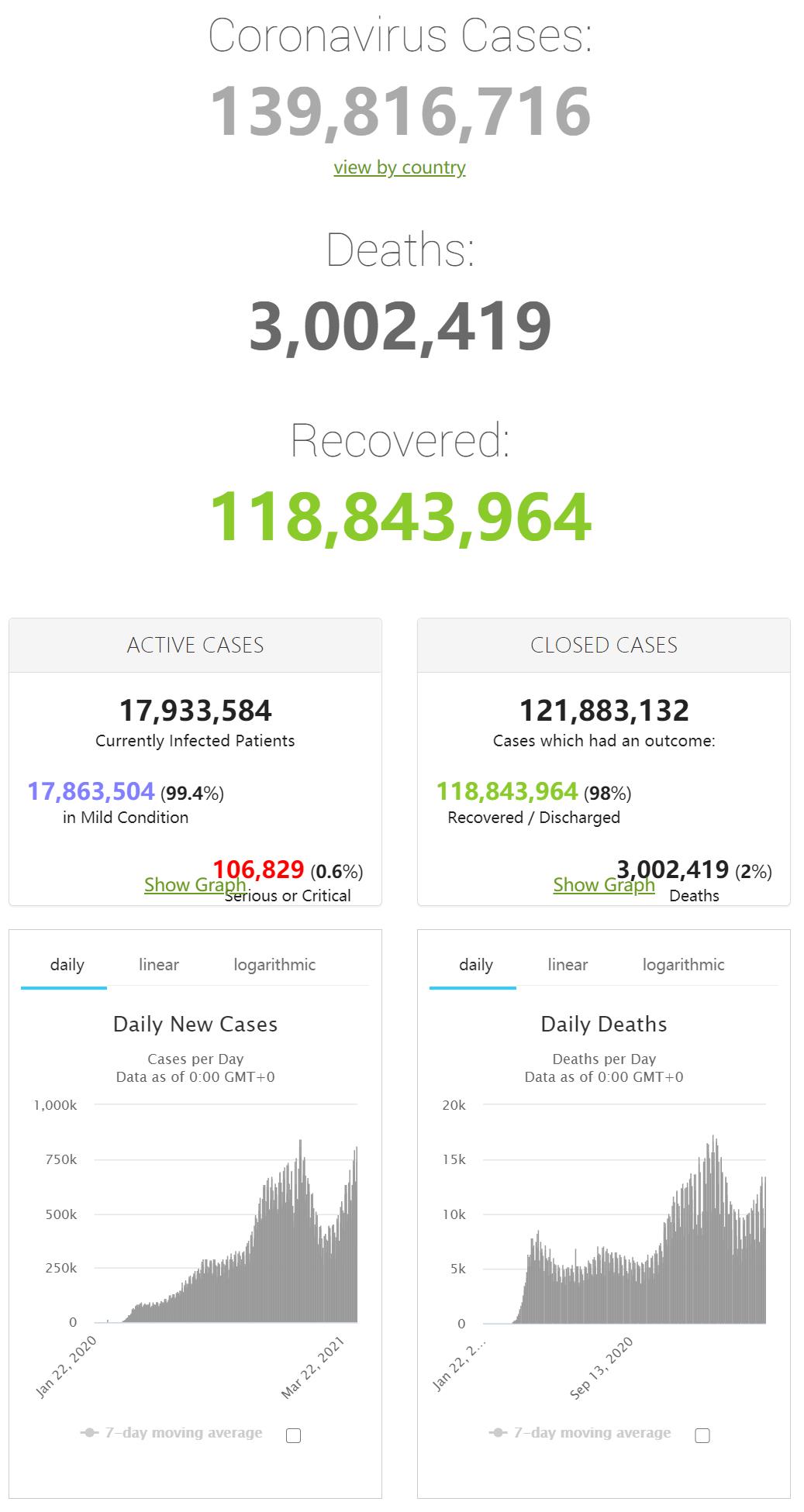
|
Country, |
Total |
New |
Total |
|
World |
139,667,421 |
+837,793 |
2,998,914 |
|
32,224,139 |
+74,479 |
578,993 |
|
|
14,287,740 |
+216,850 |
174,335 |
|
|
13,758,093 |
+80,529 |
365,954 |
|
|
5,187,879 |
+38,045 |
100,073 |
|
|
4,675,153 |
+8,944 |
104,398 |
|
|
4,380,976 |
+2,672 |
127,191 |
|
|
4,086,957 |
+61,400 |
35,031 |
|
|
3,826,156 |
+16,974 |
115,937 |
|
|
3,396,685 |
+9,663 |
76,882 |
|
|
3,095,016 |
+30,634 |
80,141 |
|
|
2,642,242 |
+21,130 |
60,612 |
|
|
2,629,156 |
+24,999 |
58,925 |
|
|
2,602,719 |
+16,918 |
67,199 |
|
|
2,291,246 |
+5,113 |
210,812 |
|
|
2,168,872 |
+25,078 |
65,680 |
|
|
1,903,765 |
+16,427 |
38,658 |
|
|
1,681,063 |
+13,326 |
56,149 |
|
|
1,593,865 |
+3,710 |
28,279 |
|
|
1,589,359 |
+6,177 |
43,073 |
|
|
1,562,931 |
+1,372 |
53,571 |
|
|
1,378,145 |
+8,734 |
16,861 |
|
|
1,101,698 |
+7,431 |
24,766 |
|
|
1,096,716 |
+9,564 |
23,500 |
|
|
1,020,301 |
+3,852 |
25,800 |
|
|
956,860 |
+7,810 |
14,885 |
|
|
935,316 |
+4,713 |
23,603 |
|
|
904,285 |
+11,429 |
15,594 |
|
|
836,706 |
+202 |
6,314 |
|
|
829,358 |
+501 |
16,933 |
|
|
739,818 |
+5,395 |
15,872 |
|
|
736,982 |
+5,307 |
24,521 |
|
|
707,362 |
+4,192 |
10,081 |
|
|
679,138 |
+2,963 |
8,057 |
|
|
654,870 |
+2,971 |
5,881 |
|
|
586,883 |
+2,678 |
9,813 |
|
|
516,121 |
+3,952 |
9,500 |
|
|
504,800 |
+2,501 |
6,809 |
|
|
504,260 |
+596 |
8,927 |
|
|
491,423 |
+1,928 |
1,545 |
|
|
402,142 |
+985 |
6,791 |
|
|
382,761 |
+2,185 |
14,979 |
|
|
373,950 |
+843 |
10,877 |
|
|
367,977 |
+2,148 |
1,363 |
|
|
359,830 |
+314 |
6,183 |
|
|
355,431 |
+4,892 |
17,489 |
|
|
340,023 |
+1,222 |
2,393 |
|
|
308,006 |
+3,822 |
9,239 |
|
|
300,900 |
+2,927 |
6,442 |
|
|
294,211 |
+2,317 |
4,045 |
|
|
292,244 |
+1,030 |
3,908 |
|
|
285,291 |
+1,108 |
12,519 |
|
|
282,054 |
+490 |
3,066 |
|
|
279,376 |
+2,649 |
9,553 |
|
|
278,695 |
+2,641 |
3,306 |
|
|
276,407 |
+1,717 |
2,937 |
|
|
259,639 |
+379 |
3,405 |
|
|
253,066 |
+1,391 |
1,428 |
|
|
244,528 |
+2,367 |
5,110 |
|
|
244,177 |
+812 |
5,493 |
|
|
242,402 |
+297 |
4,820 |
|
|
240,330 |
+798 |
2,449 |
|
|
236,554 |
+2,149 |
3,285 |
|
|
230,513 |
+1,219 |
3,732 |
|
|
229,967 |
+891 |
4,142 |
|
|
227,533 |
+1,121 |
3,065 |
|
|
213,798 |
+837 |
12,611 |
|
|
208,694 |
+1,567 |
7,120 |
|
|
206,142 |
+1,014 |
3,817 |
|
|
198,214 |
+1,510 |
4,905 |
|
|
193,952 |
+989 |
357 |
|
|
179,365 |
+1,271 |
1,853 |
|
|
176,668 |
+1,035 |
1,821 |
|
|
170,558 |
+513 |
2,873 |
|
|
164,080 |
+80 |
2,061 |
|
|
160,934 |
+970 |
574 |
|
|
156,499 |
+4,410 |
1,726 |
|
|
149,219 |
+1,091 |
2,424 |
|
|
145,001 |
+890 |
4,357 |
|
|
142,610 |
+5 |
3,206 |
|
|
129,128 |
+169 |
2,335 |
|
|
119,142 |
+167 |
3,144 |
|
|
116,200 |
+572 |
1,064 |
|
|
112,117 |
+698 |
1,788 |
|
|
109,731 |
+643 |
2,030 |
|
|
106,224 |
+953 |
707 |
|
|
95,949 |
+212 |
608 |
|
|
95,042 |
+183 |
1,412 |
|
|
91,545 |
+68 |
766 |
|
|
91,144 |
+305 |
1,540 |
|
|
90,532 |
+143 |
1,230 |
|
|
90,457 |
+10 |
4,636 |
|
|
90,408 |
+1,004 |
491 |
|
|
85,730 |
+227 |
634 |
|
|
83,253 |
+289 |
885 |
|
|
69,002 |
+75 |
794 |
|
|
67,099 |
+283 |
2,060 |
|
|
64,549 |
+215 |
785 |
|
|
60,735 |
+16 |
30 |
|
|
37,453 |
+1,543 |
97 |
|
|
10,219 |
+60 |
92 |
|
|
2,758 |
+25 |
35 |
Retrieved from: https://www.worldometers.info/coronavirus/
From CNN’s Jen Christensen
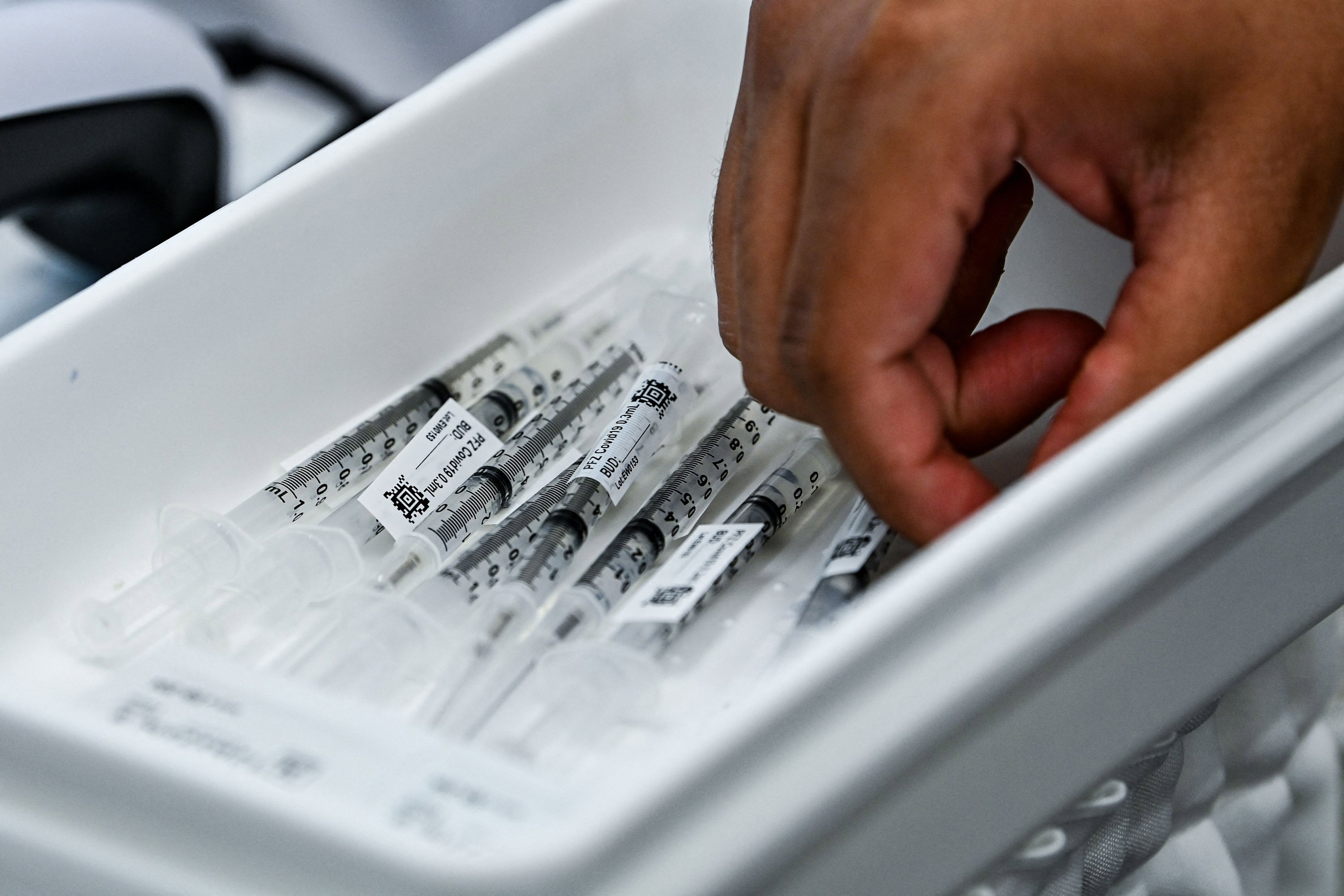
Pharmacy student Jason Rodriguez prepares Pfizer vaccines at the Christine E. Lynn Rehabilitation Center in Miami on April 15. Chandan Khanna/AFP/Getty Images
Even young and relatively healthy people who have had Covid-19 before should still get a vaccine to prevent re-infection and to slow down the spread of the disease, new research suggests.
The study, published Thursday in the journal the Lancet Respiratory Medicine, found that about 10% of those who had previous infections in the study became reinfected, compared to the 50% of new infections among those who had not had Covid-19 before.
The study was conducted among more than 3,000 otherwise healthy US Marines between May and November of 2020. Most of the people in the study were men between the age of 18 and 20.
For the study, the Marines had an unsupervised two-week quarantine at home before going into a Marine facility that had a supervised quarantine for another two weeks.
The Marines underwent antibody tests at the start of camp to determine if they had prior infection. Nearly 200 had indicators that they had a prior Covid-19 infection, more than 2,200 had no signs of prior infection.
The Marines were given a biweekly PCR test throughout their time in basic training that lasted about six weeks. Across both groups there were more 1,098 new infections during the study, 19 of which had a prior infection.
“Immunity is not guaranteed by past infection, and vaccinations that provide additional protection are still needed for those who have had COVID-19,” said study co-author Dr. Stuart Sealfon, a professor of neurology and pharmacological sciences at the Icahn School of Medicine at Mount Sinai.
There are limits to the study. Researchers were unable to determine the severity of infection among those who had Covid-19 before. Some infections may also have been missed in the period between the bi-weekly PCR testing during the program. Researchers also believe the risk of reinfection would be about the same for other demographics, although the exact rates may vary. Earlier studies among populations that don’t live in such crowded conditions found lower reinfection rates.
A commentary that accompanied the research said that the study showed some “interesting insights” about reinfection.
“These data confirm that seropositive individuals have a significant albeit limited protection for new infections,” the commentary written by Maria Velasco, a researcher at Hospital Universitario Fundación Alcorcón, Spain, said. “Second, the rate of new SARS-CoV-2 PCR detection among seropositive Marines cases is not negligible (1·1 cases per person-year), even in the young and healthy population. Globally, these results indicate that COVID-19 does not provide an almost universal and long-lasting protective immunity such as measles.”
From CNN’s Deidre McPhillips
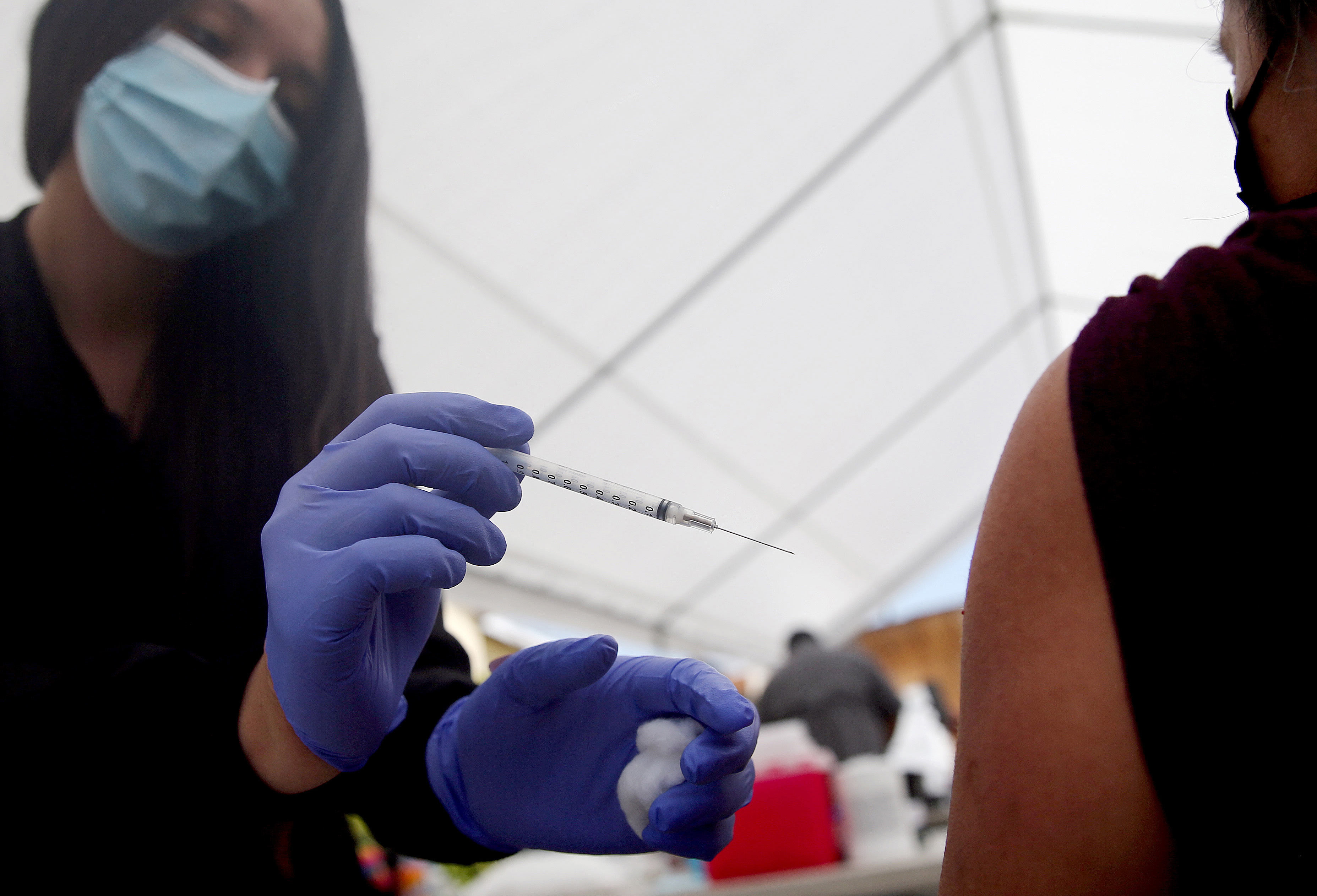
A health care worker administers a dose of the Pfizer COVID-19 vaccine at CIELO, an Indigenous rights organization, on April 10 in Los Angeles. Mario Tama/Getty Images
About 198 million doses of Covid-19 vaccine have been administered in the United States, according to data published Thursday by the US Centers for Disease Control and Prevention.
The CDC reported that 198,317,040 total doses have been administered, about 78% of the 255,400,665 doses delivered.
That’s about 3.5 million more doses reported administered since yesterday, for a seven-day average of about 3.3 million doses per day.
More than 30% of adults in the US are fully vaccinated, and about 48% of adults have received at least one dose of vaccine. Among seniors, about 64% are fully vaccinated and 80% have received at least one dose.
Overall, about 78.5 million people in the US are fully vaccinated and nearly 126 million people have received at least one dose, according to CDC data.
Data published by the CDC may be delayed, and doses may not have been given on the day reported.
From CNN’s Will Godley and Chris Liakos
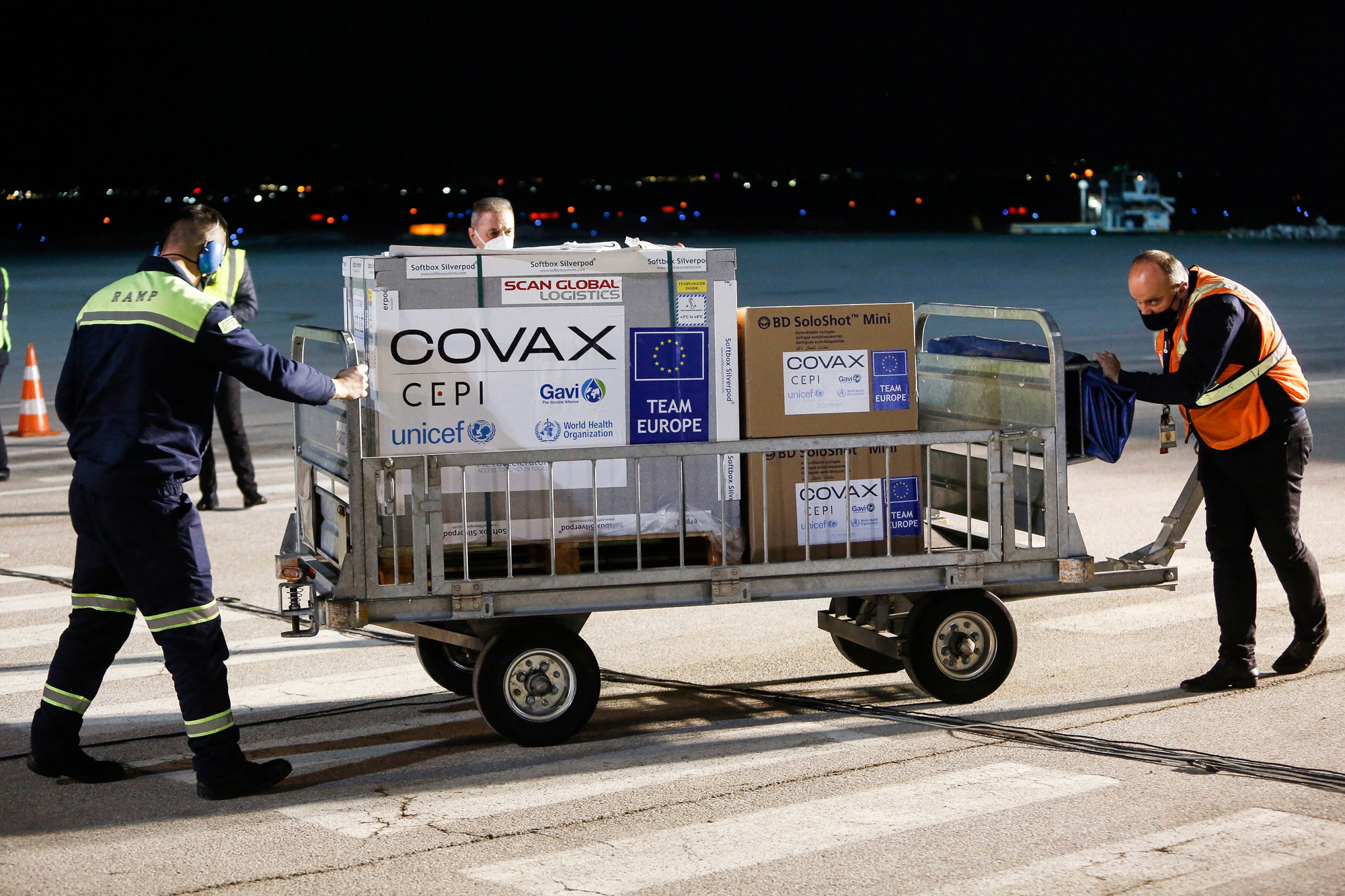
Airport employees push a cart carrying a shipment of AstraZeneca/Oxford Covid-19 vaccines at the Pristina International Airport on March 28. AFP/Getty Images
A new campaign to raise $2 billion for the global fight against Covid-19 was launched today at an event hosted by the United States and Gavi, the Vaccine Alliance.
Gavi have set a deadline of June for this additional round of funding, which would enable them to finance a total of 1.8 billion doses of COVAX Covid-19 vaccines for 92 lower-income countries by the end of the year.
COVAX is a program is co-led by Gavi, the Coalition for Epidemic Preparedness Innovations (CEPI) and the World Health Organization. Its aim is to accelerate the development and manufacture of coronavirus vaccines, and to guarantee fair and equitable access for every country in the world.
At the event, governments and private sector partners made early pledges worth nearly $400 million and committed to donate millions of Covid-19 vaccine doses to COVAX to benefit the most vulnerable, according to the news release.
It includes commitments by Sweden, Denmark, Portugal, the Netherlands, the Bill & Melinda Gates Foundation and the Visa Foundation among others. Google also announced a commitment to donate $2.5 million to COVAX and $15 million in Ad credits to Gavi. New Zealand said it would donate 1.6 million vaccine doses to COVAX, with a focus on the Pacific region.
Speaking at the event, Gavi CEO Seth Berkley warned that the global supply of Covid-19 vaccines is “ incredibly tight right now.” He said it is unlikely COVAX will be able to secure “more supply in 2021 beyond the doses that we have reserved,” calling on countries with excess supply to share spare vaccine doses with COVAX.
At the same event, AstraZeneca CEO Pascal Soriot admitted the company has had bumps in the road. “It’s been not only an R&D challenge but also a manufacturing challenge,” he said adding that “manufacturing is ramping up very quickly now.”
From CNN's Arnaud Siad
Norway will stop using the Oxford-AstraZeneca Covid-19 vaccine as part of its vaccination program because of the risk of side effects in the younger population, the Norwegian Institute of Public Health announced on Thursday.
The institute said there is now a “greater risk associated with the AstraZeneca vaccine than with the Covid-19 disease in Norway,” in a statement on its website.
“Since there are few who die of Covid-19 in Norway, the risk of dying by being vaccinated with the AstraZeneca vaccine would be greater than the risk to die from the disease, particularly among young people,” Geir Bukholm, Director of infection control at the Institute of Public Health, said, according to the statement.
The Institute explains that Norway “has come a long way” in vaccinating its elderly population and the continued use of the vaccine would now be mostly relevant for those age 65 and younger.
“There is now significantly more knowledge about the connection between the AstraZeneca vaccine and the rare and serious incidents of low platelets, blood clots and bleeding, than when Norway chose to put further use of the AstraZeneca vaccine on pause in March,” Bukholm also said. “Based on this knowledge, we have arrived at a recommendation that the AstraZeneca vaccine be removed from the coronavirus vaccination program in Norway.”
In the statement, Bukholm went on to point out that this “has not been an easy recommendation” with a direct impact on the vaccination rollout and infection control measures.
Remember: The European Medicines Agency (EMA) said on April 7 that a particular combination of unusual blood clots with low blood platelet counts should be listed as a side effect of the Oxford-AstraZeneca vaccine, but stopped short of recommending its use be limited. The benefits of the shot outweigh the risks and Covid-19 is a "very serious disease," it added.
From CNN’s Ramin Mostaghim in Tehran

Iranian President Hassan Rouhani is pictured on April 13, during a meeting with Russian Foreign Minister Sergey Lavrov in Tehran. Russian Foreign Ministry Press Service/AP
Iran's Ministry of Health reported 25,078 new Covid-19 cases Thursday, bringing the country's total case tally to 2,168,872.
Iranian President Hassan Rouhani has said the country is experiencing a fourth wave of infection.
At least 4,601 patients remain hospitalized in ICUs across the country, a Ministry of Health spokeswoman, Sima Sadaat Lari, said in a press conference on state TV.
Iran has the most severe Covid-19 outbreak in the Middle East, with the highest number of cases and deaths in the region.
Cases have surged following New Year festivities in late March.
The country has categorized 295 cities and towns with high case tallies as "red zones". These areas are in semi-lockdown and non-essential businesses are closed.
From CNN's Niamh Kennedy in Dublin
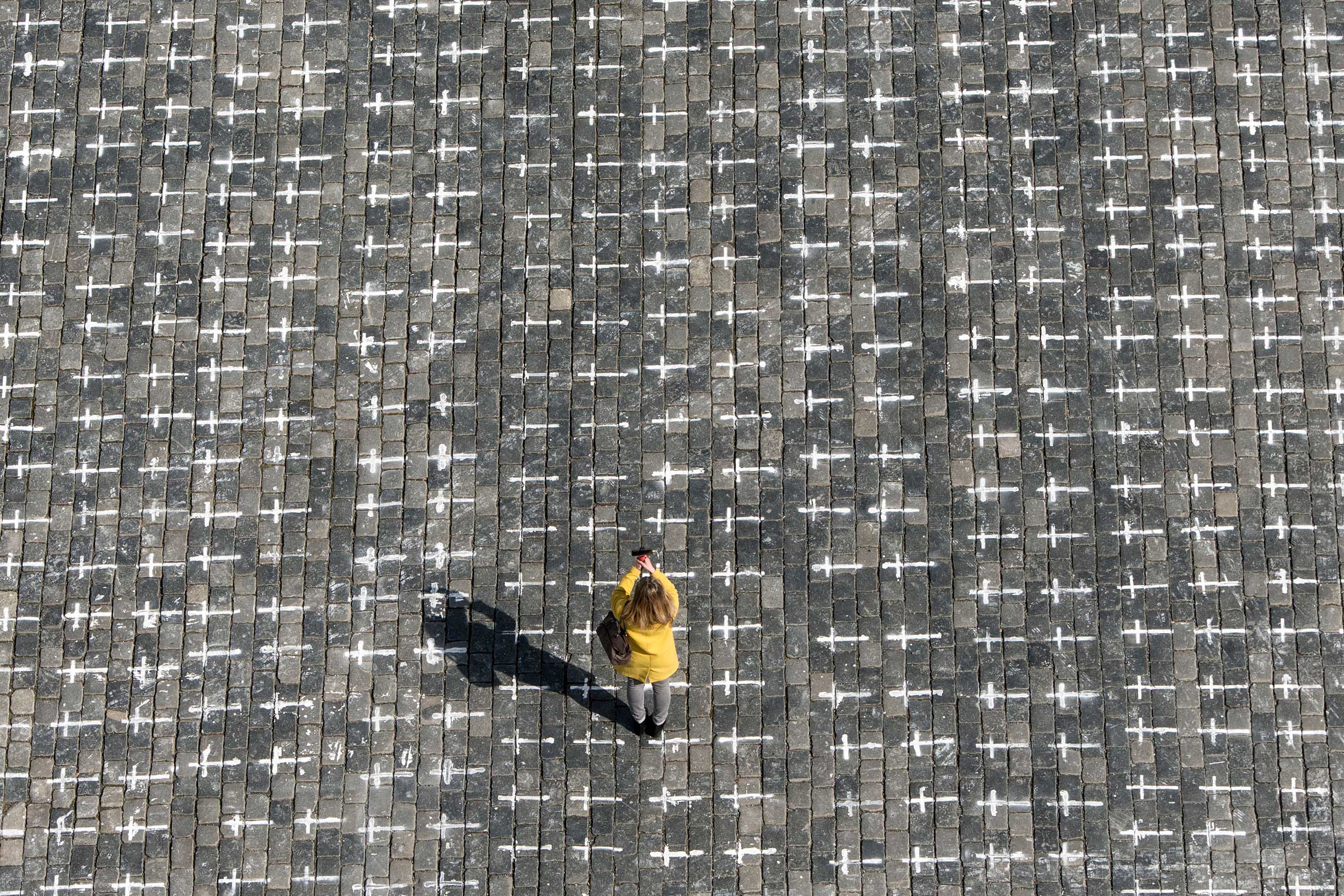
A person takes a photo at the Old Town Square in Prague, Czech Republic, on March 22, where thousands of crosses have been drawn on the pavement to commemorate the first anniversary since the death of the first Czech coronavirus patient. Michal Cizek/AFP/Getty Images
Europe has surpassed one million Covid-19 related deaths, the World Health Organization (WHO) said on Thursday.
The grim milestone was passed last week, WHO Regional Director for Europe Hans Kluge said in a press conference.
Kluge warned that despite the progress of the European vaccine rollout the situation in the region remained "serious."
"1.6 million new cases are reported every week. That's 9500 every hour, 160 people every minute," he said.
The WHO Europe region is composed of 53 countries and includes non-EU states such as Turkey and Russia.
Early signs of decline in some countries do not necessarily equate to "lower rates of transmission," Kluge cautioned.
The decline in incidence rates has been observed "only amongst the oldest" of people so far with hospitalization remaining "nonetheless at high levels" he added.
The WHO has continuously received reports of "intensive care capacity having been exceeded from all parts of the region" with Kluge pointing towards France where ICU admissions in April "reached the highest levels since last year."
Social measures in countries should be adjusted "based not on vaccination targets, but on the basis of epidemiology, and the ability of our health services and workforce to cope with Covid-19," Kluge said.
Retrieved from: https://edition.cnn.com/world/live-news/coronavirus-pandemic-vaccine-updates-04-14-21/index.html
By Jeffrey Gettleman, Suhasini Raj, Sameer Yasir and Karan Deep Singh

Migrant workers waited for trains in Mumbai, India, on Monday. The city is under lockdown because of the latest surge in Covid-19 cases.Credit...Atul Loke for The New York Times
As dawn broke, Kaleem Ansari waited outside the central rail station in Mumbai, India, with thousands of others for his train to pull in. Mr. Ansari, who works in a sandal factory, carried old clothes in his backpack and 200 rupees — not quite $3 — in his pocket.
Mumbai was locking down as a second wave of the coronavirus rippled through India. Mr. Ansari, from a small village nearly a thousand miles away, stayed in the city for the first lockdown, in 2020, and vowed not to suffer through another.
“I remember what happened last time,” he said on Wednesday. “I just have to get out of here.”
As India’s cities shut down and workers head to rural areas, health experts fear the virus could devastate poorly equipped villages, as it did before. The country hit another daily case record on Thursday, reporting more than 200,000 new infections, and transit hubs are packed with fleeing workers.
The traumatic mass exodus last year, after one of the world’s toughest national lockdowns eliminated millions of jobs, fueled the most disruptive migration in the region since the partition of 1947. Tens of millions of low-paid migrant workers fled, some on blistered feet, to reach loved ones and places where they could afford to live.
Hundreds died on the way. Even more died back home. The migration also spread the virus, swamping remote districts with the sick.
This time, the lockdown does not extend nationwide, but cities are increasingly enforcing restrictions, and the migrant exodus is likely to grow.
On Tuesday night, for example, Maharashtra State, which includes Mumbai, banned public gatherings and closed most businesses for two and a half weeks. The authorities had little choice, experts say. New infections are exceeding the heights of the first wave, and the true number is likely to be many times higher, while testing rates per capita lag Western countries. (So far, only about 8 percent of Indians have been vaccinated.)
The death rate, while lower than in the United States and elsewhere, is rising.
Last year, to protect uninfected villagers, officials in the large eastern state of Bihar intercepted arriving migrants, screened them and sent them to quarantine centers whether they had symptoms or not. This time, migrants from cities like Mumbai — where the positivity rate recently hit 30 percent — are simply stepping off buses and walking into hometowns, said Nafees Ahmad Sheikh, a cafe worker who left Mumbai last week, and two other recent arrivals.
“The rich can deal with another lockdown, but what will the poor do?” Mr. Sheikh said. He said he would rather die in his home village than in a city “that treats us like disposable items.”
Some officials said towns were requiring temperature checks and running quarantine centers, but one official said few centers were functioning because many contractors were not paid last year.
As for Mr. Ansari, he just wants to get home. Last time public transport had shut down and he ran out of money. He said the police would beat him when he ventured out for food. At one point he was eating only one small bowl of rice a day, he said, and feared he would starve.
“Nobody cares about us,” he said, “either here or there.”
In other news from around the world:
· A coronavirus variant with potentially worrying mutations that was first detected in India has been found in the UK. In total, 77 cases of the variant have been recorded in the UK up to 14 April, according to the latest update from Public Health England (PHE). Overall Covid-19 case rates have fallen in all regions of England.
· France’s coronavirus death toll passed 100,000. The country of 67 million is the eighth in the world to reach the symbolic six figure mark, and the third in Europe after the United Kingdom and Italy.
· Most regions in Portugal will enter the third phase of easing the Covid-19 lockdown next week, but stricter rules will stay in place in municipalities where transmission rates remain high, prime minister Antonio Costa said.
· The US is preparing for the possibility that a booster shot will be needed between nine to 12 months after people are initially vaccinated against Covid-19, David Kessler, chief science officer for president Joe Biden’s Covid-19 response task force, said.
· India’s daily coronavirus caseload has doubled in 10 days, with a record 200,000 new infections logged Thursday as authorities grapple with shortages of vaccines, treatments and hospital beds.